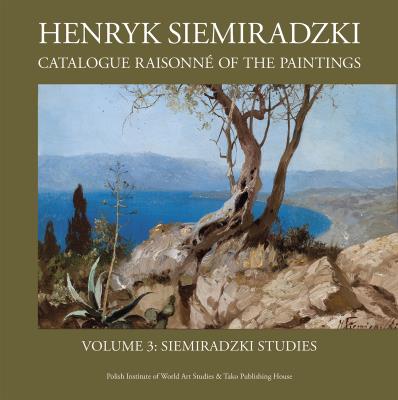The present volume Siemiradzki Studies, the product of research undertaken within the framework of the preparation of the Catalogue Raisonné of his paintings, comprises an attempt at an overview of the artist’s work, from a possibly wider perspective than that which was possible in the earlier volumes, taking into account not only the conclusions of art historians, among them curators of museum collections, but also those of archeologists and the conservators of artworks. This interdisciplinary aspect finds expression in the broad thematic spectrum of Studies which constitutes the opening section of the present volume, concentrating as they do, on the one hand, on relations between the work of Siemiradzki and the artistic heritage of Ancient Greece, Rome and Egypt, from the artist’s first contact with this tradition during the course of his studies in the St. Petersburg Academy of Arts to the period of his residence in a Rome teeming with Antiquity, and, on the other hand, his associations, both technical and institutional, with contemporary European painting, taking particular account of Russian painting, together with his influence upon the development of artistic life of a Poland divided into three partition sectors. The Studies are complemented by an Appendix containing unpublished drawings and selected details of painted textures from the painting Candleholders of Christianity (Świeczniki chrześcijaństwa, cat. 7), a listing and discussion of collections with archival sources, as well as a general bibliography for the Catalogue Raisonné, embracing the entire life and activities of the artist. The section of Studies devoted to art-historical researches includes articles concerned with less familiar aspects of the work of Siemiradzki: his earliest artistic efforts, maintained within the realist convention, which are discussed by Agnieszka Świętosławska; his studies at and subsequent relations with the Imperial Academy of Arts in St. Petersburg, discussed by Veronika Irina Bogdan; and the origins and context of the development of his decorative compositions, analysed by Marzena Królikowska-Dziubecka. In the “technical” section Paulina Adamczyk and Magdalena Laskowska summarise their conclusions regarding the artist’s graphical technique, while Dominika Sarkowicz presents her conclusions on his painting technique.
Contents
Agnieszka Kluczewska-Wójcik, Introduction
Krzysztof Cieszkowski, On translating the Catalogue Raisonné of the Paintings of Henryk Siemiradzki
Studies
Agnieszka Świętosławska, Henryk Siemiradzki – youthful realist works
Veronika Irina Bogdan, Henryk Siemiradzki at the Imperial Academy of Arts
Dorota Gorzelany-Nowak, Graeco-Roman Antiquity in the work of Siemiradzki
Grzegorz First, Not Only Rome: Siemiradzki’s Ancient Egypt and the Near East
Witold Dobrowolski, Programmatic content in The Judgement of Paris by Henryk Siemiradzki
Marzena Królikowska-Dziubecka, Decorative and allegorical compositions by Henryk Siemiradzki in relation to the tradition of European ceiling painting
Paulina Adamczyk, Magdalena Laskowska, Drawing in the work of Henryk Siemiradzki
Dominika Sarkowicz, Henryk Siemiradzki’s technical resources as a painter
Agnieszka Kluczewska-Wójcik, In “the art worlds” – Henryk Siemiradzki and the institutions of artistic life
Maria Nitka, Henryk Siemiradzki in Rome
Jerzy Malinowski, On the role of Henryk Siemiradzki in Polish culture
Miscellanea
Edited by Jerzy Malinowski
Appendix – Drawings and painterly textures Jerzy Malinowski (Drawings), Dominika Sarkowicz (Painterly textures)
Archival Sources Maria Nitka, Archival sources in Poland
Kamilla Twardowska, Archival sources in the National Museum in Kraków
Maria Nitka, Archival sources in Rome
Maria Górenowicz, Archival sources in Russia
Bibliography of the Life and Work of Henryk Siemiradzki



